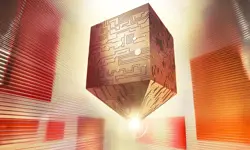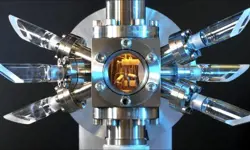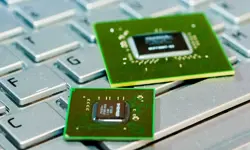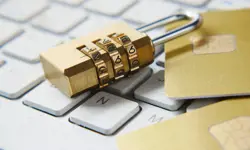
Raspberry Pi: the chip that floated a thousand ideas
Eben Upton believes that his route into engineering was typical for many British youngsters. Schools don’t teach engineering, so, like many school students, he graduated from playing with things such as Meccano and LEGO before discovering his true vocation at university. A self-proclaimed “LEGO kid”, Upton also grew up when the BBC Micro was popular. Today, Upton is the CEO of Raspberry Pi plc, a business whose products were a way into engineering for many young people. Indeed, there is now a whole community that combines the ‘Pi’ with LEGO. Upton has also seen a rapid rise in the number of working engineers who use ‘Pis’ in their work.
There was an earlier hint that engineering would prevail in Upton’s GCSE choices at school. He had signed up to for an exam in craft, design and technology (CDT). As Upton puts it: “CDT was the closest you could get to engineering, proper engineering.” Then again, he adds, CDT also had a reputation for being “a subject for kids who wanted to skip classes”.
Quick Q&A
An inspiring drive to computer club 💻
Favourite project you worked on?
BCM2836, the chip that we developed, at very low cost and on a very short schedule, to power Raspberry Pi 2.
Who influenced your engineering career?
Alan Drew, who drove me to Computer Club in Ilkley every other Friday night when I was a teenager.
What’s your advice to budding engineers?
Hang out with smart people. Volunteer for the hardest jobs. Fail. Try again. Repeat.
Which engineering achievement couldn’t you do without?
The high-bypass turbofan. Often I’ll spend a chunk of a widebody flight just gazing at the engine. Affordable international travel has had such a profound impact on my life.
Overlooked engineering successes?
Inmos, which failed as a company, but set the stage for the UK’s continuing ability to punch far above its weight in semiconductor design.
That reputation nearly got in the way of his plans. The head of the school’s design department rushed into the staff room and said to Eben’s mother, who taught at the school: “Eben’s signed up for the wrong course. He clearly meant to sign up for CDR.” CDR was craft design realisation, which, Upton says with a laugh, “you could caricature as being a nice drawing course”. His mother went home and asked him if he’d made a mistake. His response was an emphatic “no, I wanted CDT.” Upton was not alone in that decision. “I found out later that everybody who went to Cambridge to study physical sciences or engineering also did CDT.”
Learning the code
Computing was another early interest. Like many young people in the early 1990s, Upton was into home computing, writing code for various machines such as the Commodore Amiga. He’d left school a year early, at 17, “not through any particular intellect, but just bit of luck”. In between school and university, he worked at IBM as a preuniversity employee, alongside people working on different things. Over the years, these IBM alumni have bumped into each other working for different companies and launching startups. “One of my former colleagues from IBM works for me now,” he adds.
In Upton’s case, the school experience and time at IBM wasn’t enough to turn him into an aspiring engineer. He went from school in Leeds to the University of Cambridge to study physics. But that didn’t stick. “If your mind wanders at a critical moment, you can’t get back,” says Upton. For him, statistical thermodynamics was the parting of the ways.
After two years, Upton switched to the engineering department and the Electrical and Information Sciences Tripos (EIST). The degree course was “a lot of fun”, he says.
Like many young people in the early 1990s, Upton was into home computing, writing code for various machines such as the Commodore Amiga.
A positive effect of the move might seem strange given Upton’s subsequent career as a leading light in computing: he “completely dodged Fortran”. This, he explains, was a subject for physics students in their third year but was year two for engineers. When he should have been studying Fortran, a programming language for scientists, Upton was into other computer languages, leading to his first startup company, at the age of 20. The business started off working on graphics technology for the web, moving on to mobile phones and gaming. Now called Marmalade Game Studio, Upton proudly points out that, 26 years later, the company still exists. “I sold out of it a long time ago, but they’ve been paying people’s salaries. Paying tax and generating export earnings.” As he describes it “that was the thing that I dropped out of Cambridge to start”.
The business of engineering
In reality, this was not what most people would call dropped out, it was the beginning of another thread in Upton’s career after graduating. He has always been keen on business. “I like business. The business of engineering. It’s the thing that is exciting.

Upton (left) speaks with stakeholders © Raspberry Pi
“I’ve always been interested in business. I remember standing in the station in Leeds and looking at all the people walking past with their briefcases and in a hurry … and wanting to be one.” You could blame it on TV. “I used to watch Bergerac.” The TV series featured a dodgy businessperson, Charlie Hungerford. “I shouldn’t idolise a slightly corrupt fictitious businessman, but I just really thought he was amazing. He was always doing these business schemes and stuff, and it just always seemed interesting.”
In the event, the shine of that first business experience wore off and the lure of Cambridge drew him back. “I didn’t particularly want to live in Cambridge and commute to London every day. A year seems like such a long time when you’re 22 years old and you’re like, ‘Oh God, I’ve been doing this for two years’.” So he sold out to the co-founders and went on to fulfil another ambition.
“I had always wanted to do a PhD. I liked the idea of being an academic as well.” His father had spent his life as an academic, a professor of English at the University of Leeds. “He had a good run. He enjoyed it.”
Cambridge had another attraction. “I knew there is history in Cambridge of academics also doing business.” So, he felt like it could be a good place to do both things. Married by then, and with a PhD that was taking longer than it should “because I’m disorganised”, he launched a couple of little lifestyle startups to keep paying the mortgage.

“Raspberry Pi is an electronic product that’s there to help young people program computers. So, the electronic product bit of it is really important." - Eben Upton © Raspberry Pi
A move into electronics
His next move added what would turn out to be another important ingredient that led to the Raspberry Pi, he learned something about electronics. PhD completed, Upton decided that, after all, academia was not for him. “I’m not even sure it’s about intellect. I just don’t have the right orientation to succeed in that environment, I need to be making things.”
Someone in the next village had a small company making motor controllers for golf buggies. Here was a little technology business making “nice little electronic products for people”. Lots of machines needed motor controllers: shunting engines, golf carts and mobility scooters. Upton worked on software for these controllers.
He sees that experience as the last bit of the Raspberry Pi puzzle. “Raspberry Pi is an electronic product that’s there to help young people program computers. So, the electronic product bit of it is really important. That was my first exposure to electronics. I’d never managed to make that leap from doing really quite sophisticated software to doing any kind of hardware.”
It was a while though before Upton baked the first Pi. He was, in his eyes, bumbling along, until a friend suggested a job interview at Broadcom, a major communications chip design business. Broadcom was a chance to get back to Cambridge, where the company worked on mobile phones. “He tricked me into going for an interview at Broadcom,” Upton laughs. He didn’t know that lining up a recruit would get the friend get a bonus. “You got a couple of grand if you could lure one of your friends to the company. He has never even bought me a beer,” Upton jokes.
Raspberry Pis in action
From cycling to measuring earthquakes
When the Raspberry Pi first appeared, it was a surprise hit with engineers who wanted to add some computer power to their own devices and systems. When he noticed this phenomenon, Upton tried to keep track of these unexpected uses. “I used to have a spreadsheet that told me where all the Raspberry Pis were,” he says.
Such has been the industry take-up of the Pi that this could now be a full-time job. Industry now accounts for about three-quarters of the sales for Pis.
One of Upton’s early favourites was when the son of a Japanese cucumber grower used a Pi to sort thorny cucumbers, saving the farmer eight to nine hours’ manual work a day. Seven years on and the business applications of the Pi keep coming.
On your bike
Machine learning meets the Raspberry Pi in Velo AI’s Copilot, a device that warns cyclists about vehicle movements behind them. Based on Raspberry Pi’s Compute Module 4, Copilot can detect and distinguish nearby vehicles, understand when one is about to overtake, and identify an aggressive or distracted driver approaching dangerously. It then gives the cyclist an audible alert and uses flashing lights to alert the driver.
Hardened for industry
Another Pi favourite is OnLogic’s Factor 201. This starts with the Raspberry Pi Compute Module 4 and ‘hardens’ it for industrial applications, to create systems that survive shock, vibration, extreme temperatures, and airborne debris.
Factor 201 includes devices that handle everything from monitoring premises and critical infrastructure to energy management and process and quality control. As Upton puts it “just quietly keeping some important chunks of the world running smoothly”.
Movers and shakers
Another favourite at Raspberry Pi is Raspberry Shake’s line of seismometers and infrasound monitors. These devices cover the spectrum of Pi users from education and hobbyists to professional users. It has also been a hit in the world of citizen science.
Raspberry Shake proclaims that it was “created on the slopes of Volcán Bar in Panama”. After attempts to build a seismometer using other platforms, the Panamanian team spotted the rise of the Pi. Plans to raise funds surprised them. Instead of getting a few dozen backers, they ended up with hundreds.
In echoes of the birth of the original Raspberry Pi, the seismologists were flooded with orders and suddenly had to deliver 800 orders. Thanks in part to help from Raspberry Pi itself, including advice on logistics, it worked out and there are now global networks of amateur and professional users of Raspberry Shake devices sharing seismographic data.

© Raspberry Shake
Upton maintains that he went along for the Broadcom interview for the laughs. He wasn’t interested in a job. That changed at the interview where he met “impressive people who were working on fascinating projects. I came out thinking, ‘geez, I would love to work there’.” He did, for 14 years. This was at an exciting time in chip world, with the growth of the mobile phone and the rise of ‘very graphics heavy’ chips.
Broadcom wasn’t just a good place to work as a software engineer, it was the final bit of the Raspberry Pi jigsaw. After experiencing the University of Cambridge’s problems in recruiting students with IT skills, Upton was becoming interested in doing something about computer literacy among young people. “Raspberry Pi is the result of wanting to give another generation of young people the opportunity to do engineering, and wanting to give them a platform that they could use to discover computing and electronics as a way into engineering in the way that I did.
The chips we were working on at Broadcom happened to be exactly the right devices to put into a product like that.” To this day, Broadcom is the biggest supplier of chips for Raspberry Pis.
A slice of the Pi
With a £20 price tag, the Pi crashed into a market at a time when, if you wanted to play around with computing, you didn’t have much choice beyond paying out for a fully fledged PC. As Upton says: “The Raspberry Pi came along and kind of ate my life and ate my Broadcom career. The rest, I suppose, is history.” Part of that history was when the Raspberry Pi collected the Royal Academy of Engineering’s MacRobert Award.

Upton, centre, on the day that Raspberry Pi floated on the London Stock Exchange © London Stock Exchange
Recently, Raspberry Pi floated on the London Stock Exchange in July 2024. Upton has been the CEO of the company since it was set up as a trading operation in 2012, separate from the educational foundation that handles that ambition to do something about enthusing young people about IT and engineering.
Why go public after the company has been successfully, and profitably, making Pis for 12 years? “For somebody who’s fascinated with business, listing your company on the stock market is a fascinating thing to be involved in. It’s a hard thing to do, obviously. It’s been a challenging environment to list a company in. That it went well is incredibly gratifying. What surprises me about the whole story really is that I’m still learning.”
For Upton, going public with Raspberry Pi was a natural step forward. “You’ve got the ability for the company to tap public markets for finance, if we need to. Because some of the engineering programmes we do now are enormous. Raspberry Pi five was a $25 million programme.” In recent years, the business has been investing about $10 million a year in R&D.
Going public is an opportunity for early investors to recoup some of the money they put into the business, it is also a way to reward staff and provide an easy market for them to trade in the shares allocated to them over the years. “I don’t think it’s been to the detriment of the purity of the business. We still get to do amazing engineering.”
And that engineering has changed in the life of Raspberry Pi. What started off as tool for school students has moved on to being a broader operation. It has also got into chip design in its own right. No longer is it a case of making products based on third-party chips and licensing the IP to someone else to manufacture them. In line with the industry model, it still doesn’t have its own manufacturing plant. “We design complete electronic products, and we have them made in a factory that we don’t own.”
There are two main business activities at Pi. The first is the original credit-card-sized complete PC. There is also a growing business in designing new chips that others can use, but that can go into Pi’s own computer modules. “It lets us make cooler Raspberry Pi products.”
Career timeline and distinctions
Studied physics and engineering, 1996–1999, then a diploma in computer science, University of Cambridge, 2000–2001. PhD in computer science, 2001–2005. Founder, PodFun, 2004–2006.
Director of Studies in Computer Science, St John’s College, Cambridge, 2004–2007. Distinguished engineer, Broadcom, 2006–2020. Awarded Royal Academy of Engineering Silver Medal, 2013.
Appointed Commander of the British Empire, 2016. Elected a Fellow of the Royal Academy of Engineering, 2017. Founder, Raspberry Pi Foundation, 2008–present day. Chief Executive Officer, Raspberry Pi, 2020–present day.
Since the early days of the Pi engineers outside education have looked at this inexpensive neat little device and seen ways to use them in their own systems and products. The core of the company’s business now is selling prefabricated compute subsystems that people integrate into larger products. About three-quarters of the sales of Pi are to the “industrial and embedded” market.
This sort of development needs money. Although Pi isn’t gobbling up cash in the nine-figure numbers needed to make chips for AI. Already running late for his next meeting, Upton can’t resist responding to a last-minute question about AI and what it could do for the electronics industry and the world as a whole. “Look, it’s a tool. It’s not AI,” he laughs. “Machine learning is much more accurate branding than artificial intelligence. It’s just a new thing and continuous improvement on the tools we have.”
You could almost say the same thing about the Pi. What started as a tool for classrooms and hobbyists has turned out to be a powerful, exciting, often surprising set of tools. It is also a tool in Upton’s transformation from software engineer to business engineer. But that didn’t quite work out as planned: the suits and briefcases that first caught his eye on Leeds station seem to be things of the past. Today’s meetings are as likely as not to be train free. When we spoke in an online session, Upton was in his office wearing shorts and a T-shirt. As to the briefcase, paperwork has mostly given way to a portable computer of some sort, although there might be room for a pack of Raspberry Pis.
Contributors
Michael Kenward OBE
Author
Keep up-to-date with Ingenia for free
SubscribeRelated content
Software & computer science

Pushing the barriers to model complex processes
In 2007, Imperial College London spinout Process Systems Enterprise Ltd won the MacRobert Award for its gPROMS (general-purpose PROcess Modelling System) software. Costas Pantelides and Mark Matzopoulos, two of the key people behind the success of gPROMS, tell how they created a way in which engineers can harness physics, chemistry and engineering knowledge within a framework that solves highly complex mathematical problems.

Compact atomic clocks
Over the last five decades, the passage of time has been defined by room-sized atomic clocks that are now stable to one second in 100 million years. Experts from the Time and Frequency Group and the past president of the Institute of Physics describe a new generation of miniature atomic clocks that promise the next revolution in timekeeping.

The rise and rise of GPUs
The technology used to bring 3D video games to the personal computer and to the mobile phone is to take on more computing duties. How have UK companies such as ARM and ImaginationTechnologies contributed to the movement?

EU clarifies the European parameters of data protection
The European Union’s General Data Protection Regulation, due for adoption this year, is intended to harmonise data protection laws across the EU. What are the engineering implications and legal ramifications of the new regulatory regime?
Other content from Ingenia
Quick read

- Environment & sustainability
- Opinion
A young engineer’s perspective on the good, the bad and the ugly of COP27

- Environment & sustainability
- Issue 95
How do we pay for net zero technologies?
Quick read

- Transport
- Mechanical
- How I got here
Electrifying trains and STEMAZING outreach

- Civil & structural
- Environment & sustainability
- Issue 95